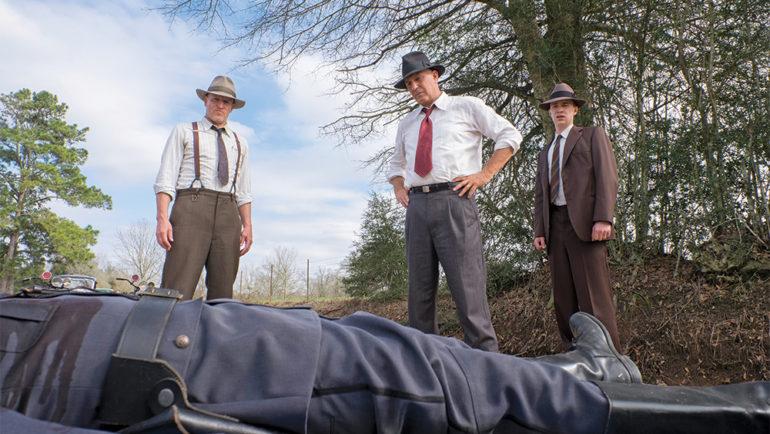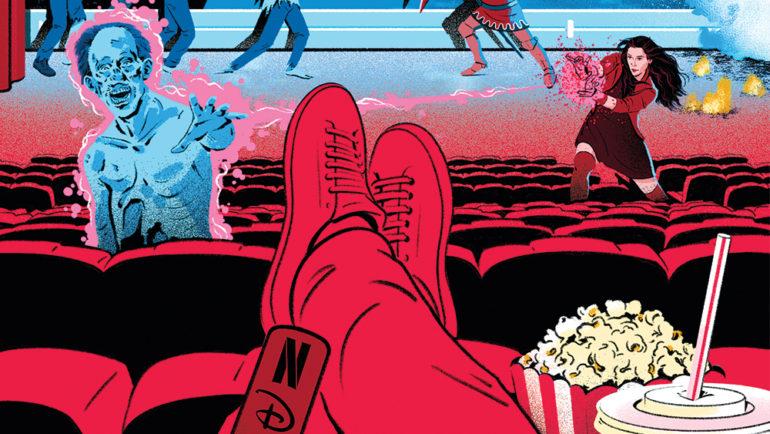CinemaCon 2019’s Hottest Debate? Exhibitors vs. Streaming
By Rebecca Rubin
LOS ANGELES (Variety.com) – This year’s could be heavy on drama.
Netflix, the streaming giant upending the film business, won’t take the stage at the annual exhibition industry confab in Las Vegas, but it’s going to be the topic du jour. The company’s recent success at the Oscars has caused some blowback. Steven Spielberg, for instance, is trying to prevent players that debut their films with only a token theatrical release from being eligible for Academy Awards.
isn’t the only wild card that has theater owners worried. In the coming months, Disney, Apple and WarnerMedia will launch direct-to-consumer services, with Comcast set to debut its platform in 2020. To compete with Netflix, they plan to unveil series and movies with big names and budgets, something that could cannibalize ticket sales and scramble the exhibition industry ecosystem.
CinemaCon is intended to be a four-day love fest and an opportunity for studios to rhapsodize about the beauty of the theatrical experience while plying exhibitors with chicken dinners and cocktails. Inevitably, however, something happens to spoil the good vibes. Past CinemaCons have provoked heated exchanges over everything from studios’ attempts to premiere movies on cable services within weeks of their debut, to Sean Parker’s Screening Room, a stalled plan to provide new releases to well-heeled customers that once drew support from Spielberg and Martin Scorsese.
If tradition holds, this year’s conference could be another forum for airing grievances. That’s because theater owners and studios are hitting Sin City at a time when conflicts between streaming services and traditional media companies are intensifying. As streamers position themselves as more legitimate players in the moviemaking space, the debate surrounding windows, an industry term for the length of time a movie plays exclusively in theaters, has reignited.
Traditional Hollywood studios run their movies in cinemas for 90 days before they are available on home entertainment. The idea is that audiences will be more inclined to venture to their local multiplex to catch the buzziest new movies if they can’t watch them at home for a few months. Netflix is challenging that model. Unlike studios, the streamer doesn’t rely on box office ticket sales to make up for expensive production and marketing costs. Moreover, the company believes its subscribers don’t want to wait three months before watching a Netflix release — they want content, and they want it now.
So far, doling out big bucks for Hollywood’s top filmmakers has worked. Alfonso Cuarón’s “Roma” and the Coen brothers’ “The Ballad of Buster Scruggs” both received love this awards season, further cementing streamers as a real threat to studios. But as Netflix shells out to entice the Cuaróns and Coens of the world, who still champion the silver screen, the streamer is being pressured to compromise with theaters. Netflix has come around to the idea of theatrical releases, sort of. The company is attempting to operate on its own terms, negotiating with exhibitors to be more flexible with what they consider a traditional window.
Instead of conforming to the standard 90-day window, Netflix is taking its movies to the big screen on a case-by-case basis. Cuarón’s art-house drama “,” which took home three Oscars, played in around 200 theaters in North America and had a three-week exclusive run in cinemas. Meanwhile “The Highwaymen,” a crime drama starring Woody Harrelson and Kevin Costner, is showing in 25 theaters across the country. While smaller circuits have agreed to screen Netflix films, larger chains like AMC and Regal aren’t giving in just yet.
“It still feels like there’s not really that much interest in compromise in that space from the exhibition industry,” says Tim League, founder of Alamo Drafthouse, who adds that he’s willing to consider screening high-profile Netflix movies. “I do hope there is some level of open discussion about what compromise positions can be. I’m fairly flexible on it, depending on the content.”
One such film could be Scorsese’s “The Irishman,” a mobster drama starring Robert De Niro, Al Pacino, Joe Pesci and Harvey Keitel, the kind of call sheet that has exhibitors drooling. Word is that Netflix is planning to give the gangster movie even more of an exclusive theatrical run than it did with “Roma,” but it’s not clear if that will be enough to convince major chains to show the film.
“Streamers are going to work with theater owners on what is acceptable for both of them,” says Patrick Corcoran, VP and chief communications officer for the National Assn. of Theatre Owners, the organization that puts on CinemaCon. “Windows have never been written in stone. They’ve been flexible to a degree. Different movies have different windows.”
This time next year, it won’t just be Netflix with skin in the game. While Hollywood studios are still pledging loyalty to the traditions of cinema, allegiances could shift as , and focus more resources on attracting customers to their streaming services. In a sign of the importance of the new services, Disney CEO Bob Iger has repeatedly called the launch of Disney Plus the company’s “highest priority.” There’s a sense that as studios round outtheir slates, they’ll want more flexibility in terms of when they can debut their movies on these services.
| Netflix is showing “The Highwaymen,” starring Woody Harrelson and Kevin Costner, in a limited theatrical release. Courtesy of Netflix |
The preponderance of new streaming content could siphon off audiences as lines between film and premium cable content become blurred. Marvel heroes like Loki and Scarlet Witch are getting their own TV series, starring Tom Hiddleston and Elizabeth Olsen, respectively, on Disney’s streaming service. Disney Plus will also be home to “The Mandalorian,” a live-action television show set in the world of “Star Wars.” It’s going to be a tougher sell to get audiences off the couch when they can get the thrill of the Cinematic Universe without having to pay $20 per movie. For the first time, the studios are having internal decisions about what constitutes a theatrical film versus streaming.
“All those streamers are competing with each other for consumers and filmmakers. One way to differentiate products for consumer is theatrical release,” says Corcoran.
Even without the disruption of streamers, CinemaCon stands to look a little different this year. There’s one less studio churning out content, as Disney now owns Fox’s film assets. Others, such as Sony, aren’t bothering to make the trek to the desert.
It’s not all doom and gloom for cinemas. Theater owners believe they have good reason to dismiss signs of the apocalypse. Last year was a banner one at the box office as ticket sales set domestic, international and global records. Blockbusters like “Avengers: Infinity War” and “Jurassic World: Fallen Kingdom,” along with breakout hits such as “A Quiet Place” and “Bohemian Rhapsody,” signaled one very important thing to exhibitors: People still love going to the movies. It’s not just rising inflation that’s accounting for the surge in change. Attendance was also up almost 5%.
“If anything, last year’s record year proved if you make something people want to see, they will go,” says Chris Aronson, Fox’s head of domestic distribution. “That’s why ‘Captain Marvel’ has grossed over $500 million. It’s why ‘The Upside’ has grossed $100 million. You can’t tell me if it’s something people want to see they won’t pony up and go, because they will.”


